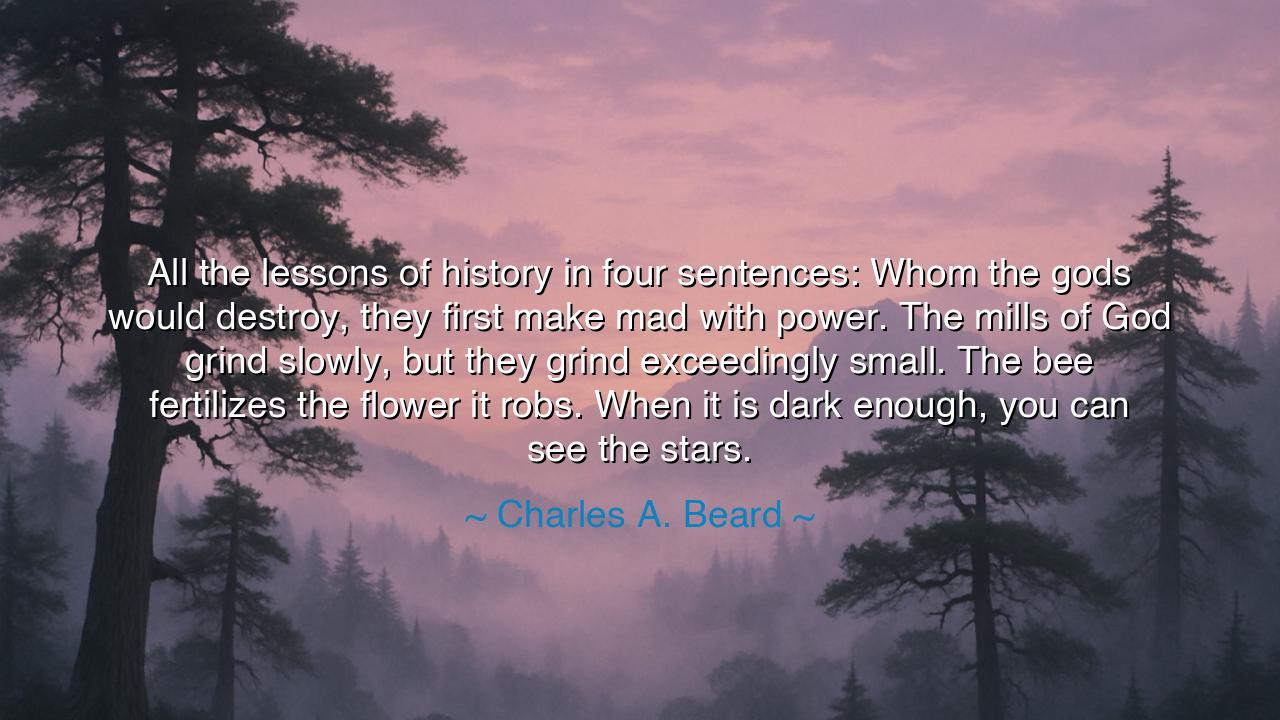
All the lessons of history in four sentences: Whom the gods would
All the lessons of history in four sentences: Whom the gods would destroy, they first make mad with power. The mills of God grind slowly, but they grind exceedingly small. The bee fertilizes the flower it robs. When it is dark enough, you can see the stars.






“All the lessons of history in four sentences: Whom the gods would destroy, they first make mad with power. The mills of God grind slowly, but they grind exceedingly small. The bee fertilizes the flower it robs. When it is dark enough, you can see the stars.” Thus spoke Charles A. Beard, the historian and philosopher, whose heart and mind grasped the eternal rhythm of rise, ruin, and renewal in human affairs. In these four short sentences, he condensed the long scroll of history — the triumphs and tragedies of empires and men — into the essence of timeless wisdom. Each line is a stone upon which the edifice of understanding is built, and together they form a map of human destiny: from the blindness of power, through the justice of time, to the strange mercy found in suffering.
The first sentence, “Whom the gods would destroy, they first make mad with power,” is an echo from the ancient Greeks, who saw hubris — pride beyond measure — as the seed of destruction. When mortals, drunk with ambition, believe themselves divine, fate moves to humble them. Power, when untempered by humility, becomes madness, and madness becomes ruin. From the fall of Alexander, who sought to be a god, to the downfall of Napoleon, who crowned himself emperor of the world, history’s path is littered with the remains of those who reached too high. The gods do not need to strike such men down; their arrogance becomes their own undoing. Thus, Beard reminds us: beware the intoxication of power, for it blinds the soul and calls forth its own destruction.
The second truth follows, solemn and inexorable: “The mills of God grind slowly, but they grind exceedingly small.” This saying, ancient and enduring, speaks to the relentless, patient nature of justice. Though it may seem delayed, though the wicked prosper and the innocent suffer, the moral law of the universe remains unbroken. Time is the instrument of divine correction, and though its wheels turn slowly, they crush falsehood to dust in the end. Think of the long ages of tyranny and oppression that seemed eternal — the rule of kings who thought themselves gods, the empires that enslaved millions — all brought low, all forgotten save as warnings. The Third Reich, which promised a thousand years of dominion, lasted scarcely twelve. The mills of God were turning even as its banners rose, and when they finished their grinding, only silence remained.
Then Beard turns to a gentler paradox: “The bee fertilizes the flower it robs.” Here lies the lesson of interdependence, of how even acts of selfishness can yield unseen good. In the natural order, the bee takes nectar for itself, yet in doing so it spreads life. So too in the affairs of men: what appears as conflict or exploitation may, through the mysterious alchemy of time, bring growth and transformation. Nations that clash exchange ideas as well as wounds; cultures that conquer are themselves changed by those they subdue. From the ashes of war, art and science often flourish. This is no excuse for greed or cruelty, but a reminder of life’s capacity to renew itself through struggle. The bee’s theft, guided by nature’s design, becomes creation. Thus, in even our darkest interactions, there is the seed of something greater — if only we have the eyes to see it.
Finally, Beard ends with hope, as all wisdom must: “When it is dark enough, you can see the stars.” Out of despair comes revelation, for it is only in the absence of light that the hidden lights are revealed. In the ages of catastrophe — plague, war, or ruin — humanity has often rediscovered its deepest truths. When the city of Rome fell, the monks of Europe kept the spark of learning alive in silent monasteries; from that darkness came the Renaissance. When the world was broken by the Second World War, out of its shadow rose the dream of human rights and global unity. The stars of courage, compassion, and truth shine brightest against the blackness of fear. The dark is not the end, but the beginning of vision.
Each of these sentences, taken alone, is a fragment of truth; together, they form a cycle of history — power, justice, transformation, and renewal. Beard calls this the summation of all that the centuries have taught us: that pride brings downfall, that justice is inevitable, that even in loss there is creation, and that from despair comes light. It is the moral heartbeat of civilization — the rhythm by which all empires rise and fall, and all souls must learn to endure.
So, my child of the future, take these words as more than the wisdom of an old historian. Let them be your compass in an age still filled with pride and darkness. Do not seek power for its own sake, lest it consume you. Trust that justice, though slow, will prevail. Remember that even in pain, life gives birth to new life, and when you stand amid ruin, lift your eyes — for it is then that the stars will reveal themselves to you. For history, like the soul, is not a straight road but a circle — and those who understand its turning need not fear its storms.






AAdministratorAdministrator
Welcome, honored guests. Please leave a comment, we will respond soon